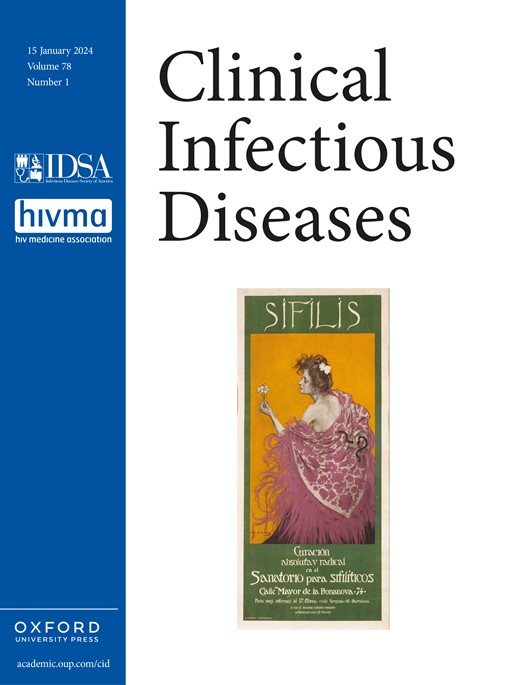因 COVID-19 而住院的免疫功能低下患者中雷米地韦相关的生存结果:来自 Omicron dominant 时代的真实证据
IF 8.2
1区 医学
Q1 IMMUNOLOGY
引用次数: 0
摘要
背景 免疫功能低下的患者发生冠状病毒病2019(COVID-19)相关住院和死亡的风险增加。随机临床试验提供的入组人数有限(如果有的话),无法为此类患者接受雷米替韦治疗的结果提供信息。方法 利用美国 PINC AI 医疗保健数据库,我们确定了 2021 年 12 月至 2024 年 2 月期间因 COVID-19 而住院的免疫力低下成年患者。主要结果是倾向评分(PS)匹配的雷米地韦组与非雷米地韦组患者的全因住院死亡率。对癌症患者、血液系统恶性肿瘤患者和实体器官/造血干细胞移植受者进行了分组分析。结果 在纳入研究的 28966 名患者中,16730 人(58%)在住院头两天接受了雷米替韦治疗。经过PS配对后,对8822名雷米地韦组患者和8822名非雷米地韦组患者进行了分析。在没有补充氧气的患者中,雷米地韦可显著降低死亡率(aHR [95% CI]:14 天,0.73 [0.62-0.86];28 天,0.79 [0.68-0.91]),在有补充氧气的患者中,雷米地韦可显著降低死亡率(14 天,0.75 [0.67-0.85];28 天,0.78 [0.70-0.86])。在癌症、血液恶性肿瘤(包括白血病、淋巴瘤和多发性骨髓瘤)和实体器官/造血干细胞移植患者亚组中,雷米替韦也与较低的死亡率相关。结论 在这一大群因 COVID-19 而住院的免疫力低下患者中,雷米替韦能显著改善患者的生存状况,包括具有不同基础免疫力低下状况的患者。将当前真实世界的证据纳入临床指南建议可为临床社区提供信息,以便在不断发展的 COVID-19 时代优化治疗决策,使其延续到公共卫生紧急状态声明结束之后。本文章由计算机程序翻译,如有差异,请以英文原文为准。
Remdesivir-associated survival outcomes among immunocompromised patients hospitalized for COVID-19: real-world evidence from the Omicron dominant era
Background Patients with immunocompromising conditions are at an increased risk for coronavirus disease 2019 (COVID-19)-related hospitalizations and mortality. Randomized clinical trials provide limited enrollment, if any, to inform outcomes of such patients treated with remdesivir. Methods Using the US PINC AI Healthcare Database, we identified adult patients with immunocompromising conditions, hospitalized for COVID-19 between December 2021 and February 2024. Primary outcome was all-cause inpatient mortality examined in propensity score (PS) matched patients in remdesivir versus non-remdesivir groups. Subgroup analyses were performed for patients with cancer, hematologic malignancies, and solid organ/hematopoietic stem cell transplant recipients. Results Of 28,966 patients included in the study, 16,730 (58%) received remdesivir during first two days of hospitalization. After PS matching, 8,822 patients in remdesivir and 8,822 patients in non-remdesivir group were analyzed. Remdesivir was associated with a significantly lower mortality among patients with no supplemental oxygen (aHR [95% CI]: 14-day, 0.73 [0.62-0.86]; 28-day, 0.79 [0.68-0.91]) and among those with supplemental oxygen (14-day, 0.75 [0.67-0.85]; 28-day, 0.78 [0.70-0.86]). Remdesivir was also associated with lower mortality in subgroups of patients with cancer, hematological malignancies (including leukemia, lymphoma, and multiple myeloma), and solid organ/hematopoietic stem cell transplantation. Conclusions In this large cohort of patients with immunocompromising conditions hospitalized for COVID-19, remdesivir was associated with significant improvement in survival, including patients with varied underlying immunocompromising conditions. The integration of current real-world evidence into clinical guideline recommendations can inform clinical communities to optimize treatment decisions in the evolving COVID-19 era, extending beyond the conclusion of the public health emergency declaration.
求助全文
通过发布文献求助,成功后即可免费获取论文全文。
去求助
来源期刊

Clinical Infectious Diseases
医学-传染病学
CiteScore
25.00
自引率
2.50%
发文量
900
审稿时长
3 months
期刊介绍:
Clinical Infectious Diseases (CID) is dedicated to publishing original research, reviews, guidelines, and perspectives with the potential to reshape clinical practice, providing clinicians with valuable insights for patient care. CID comprehensively addresses the clinical presentation, diagnosis, treatment, and prevention of a wide spectrum of infectious diseases. The journal places a high priority on the assessment of current and innovative treatments, microbiology, immunology, and policies, ensuring relevance to patient care in its commitment to advancing the field of infectious diseases.
 求助内容:
求助内容: 应助结果提醒方式:
应助结果提醒方式:


